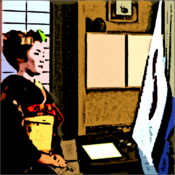Occupation of Shurigawa
This article is about the Beiwanese Occupation of Shurigawa not to be confused with Shurigawa (Koyan Prefecture)
| Capital | Okinokyo | ||||||||
|---|---|---|---|---|---|---|---|---|---|
| Official languages | Japanese | ||||||||
| Government | Military occupation | ||||||||
• Emperor | Liu-kuang | ||||||||
• Military Governor | Robert Zhang | ||||||||
| |||||||||
The Occupation of Shurigawa at the near end of Shikaeshi War was led by Robert Zhang, the Supreme Commander, with support from the Republic of Koya and Principality of Lomellina. It transformed the country into a dictatorship that recalled Beiwanese "authoritarian-personalist" politics.
Etymology
The English word Shurigawa derives from the pronunciation of the Japanese name, シュリガワ. The pronunciation Shurigawa is more formal, and is in used for most official purposes. The full title of Shurigawa is Shurigawa no jōtai Inperiaru (シュリガワの状態インペリアル), meaning the "Imperial State of Shurigawa".
Shurigawan surrender and abdication of the Empress

On 6 July 2014, Shurigawan Empress Yukie ordered to surrender to the Imperial Beiwanese Military. Two days later, Empress Yukie was forced to abdicate but she was allowed to live in the Imperial Castle. By order of the Beiwanese Emperor, the Imperial Castle of Shurigawa was forbidden for Beiwanese troops to enter. Shurigawa was ceded to the Greater Beiwanese Empire as the Occupation of Shurigawa, with the former Beiwanese Prime Minister Robert Zhang as Shurigawa's first governor.

